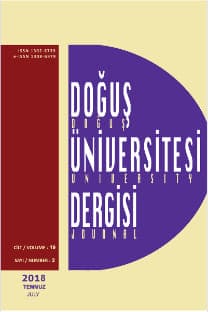İSTANBUL BORSASININ TERÖRİST SALDIRILARA REAKSİYONU
Vaka Çalışması, Terörizm, Volatilite, İstanbul Borsası
ISTANBUL STOCK MARKET’S REACTION TO TERRORIST ATTACKS
Event Study, Terrorism, Volatility, Istanbul Stock Market,
___
- ABADIE, A., GARDEAZABAL, J. (2008). Terrorism and the world economy. European Economic Review, 52 (1), pp.1-27.
- ARAS, B., TOKTAŞ, S. (2007). Al-Qaida, ‘War on Terror’ and Turkey, Third World Quarterly, 28 (5), pp.1033-1050.
- ARAZ-TAKAY, B., ARIN, P., OMAY, T. (2009). The endogenous and non-linear relationship between terrorism and economic performance: Turkish evidence. Defence and Peace Economics, 20 (1), pp.1-10.
- BARROS, C., GIL-ALANA, L. (2008). Stock market returns and terrorist violence: evidence from the Basque Country. Applied Economics Letters, 16 (15), pp.1575-1579.
- BOLAK, M., SUER, O. (2008). The effect of Marmara earthquake on financial institutions. Doğuş Üniversitesi Dergisi, 9 (2), pp.135-145.
- BOLLERSLEV, T., WOOLDRIDGE, J.M. (1992). Quasi-maximum likelihood estimation and inference in dynamic models with time varying covariances. Econometric Reviews, 11 (2), pp.143-173.
- BOLLERSLEV, T. (1986). Generealised autoregressive conditional heteroskedasticity. Journal of Econometrics, 31 (3), pp.307-327.
- CHEN, A., SIEMS, T. (2004). The effects on terrorism on global capital markets. European Journal of Political Economy, 20 (2), pp.349-366.
- CHESNEY, M., RESHETAR, G., KARAMAN, M. (2011). The impact of terrorism on financial markets: an empirical study. Journal of Banking and Finance, 35 (2), pp.253- 267.
- CRAIG MACKINLEY, A. (1997). Event studies in economics and finance. Journal of Economic Literature, 35 (1), pp.13-39.
- DRAKOS, K. (2004). Terrorism-induced structural shifts in financial risk: airline stocks in the aftermath of the September 11th terror attacks. European Journal of Political Economy 20 (2), pp.435-446.
- DRAKOS, K. (2010). Terrorism activity, investor sentiment and stock returns. Review of Financial Economics, 19 (3), pp.128-135.
- DRAKOS, K., KUTAN, A. (2003). Regional effects of terrorism on tourism in three Mediterranean countries. Journal of Conflict Resolution, 47 (5), pp.621-641.
- ELDOR, R., MELNICK, R. (2004). Financial markets and terrorism. European Journal of Political Economy, 20 (2), pp.367-386.
- ENDERS, W., SANDLER, T. (2006). The Political Economy of Terrorism, Cambridge, Cambridge University Press.
- ENDERS, W., SANDLER, T., PARISE, G. (1992). An econometric analysis of the impact of terrorism on tourism. Kyklos, 45 (4), pp.531-554.
- ENGLE, R., NG, V. (1993). Measuring and testing the impact of news on volatility. Journal of Finance, 48 (5), pp.1749-1778.
- ENGLE, R. (1982). Autoregressive conditional heteroskedasticity with estimates of the variance of United Kingdom inflation, Econometrica, 50 (4), 987-1006.
- FERIDUN, M. (2011). Impact of terrorism on tourism in Turkey: empirical evidence from Turkey. Applied Economics, 43 (24), pp.3349-3354
- FERIDUN, M., SEZGIN, S. (2008). Regional underdevelopment and terrorism: the case of south eastern Turkey. Defence and Peace Economics, 19 (3), pp.225-233
- FERNANDEZ, V. (2008). The war on terror and its impact on the long term volatility of financial markets. International Review of Financial Analysis, 17 (1), pp.1-26.
- HERBST, A., MARSHALL, J., WINGENDER, J. (1996). An analysis of the stock market’s response to the Exxon Valdez disaster. Global Finance Journal, 7 (1), pp.101-114.
- HON, M., STRAUSS, J., YONG, S. (2004). Contagion in financial markets after September 11: myth or reality? The Journal of Financial Research, XXVII (1), pp.95-114.
- KAPLANSKI, G., LEVY, H. (2010). Sentiment and stock prices: The case of aviation disasters. Journal of Financial Economics, 95 (2), pp.174–201.
- KOLLIAS, C., PAPADAMOU, S., STAGIANNIS, A. (2010). Armed conflicts and capital markets: the case of the Israeli military offensive in the Gaza Strip. Defence and Peace Economics, 21 (4), pp.357-365.
- KOLLIAS, C., PAPADAMOU, S., STAGIANNIS, A. (2011a). Terrorism and capital markets: the effects of the Madrid and London bomb attacks. International Review of Economics and Finance, 20 (4), pp.532-541.
- KOLLIAS, C., PAPADAMOU, S., STAGIANNIS, A. (2011b). Stock markets and terrorist attacks: comparative evidence from a large and a small capitalization market. European Journal of Political Economy, 27 (S1), pp.S64-77.
- KOLLIAS, C., PAPADAMOU, S., ARVANITIS, V. (2013). Does terrorism affect the stock- bond covariance? Evidence from European countries. Southern Economic Journal, 79 (4), pp.832-548.
- LLORCA-VIVERO, R. (2008). Terrorism and international tourism: new evidence. Defence and Peace Economics, 19 (2), pp.169–188.
- NIKKINEN, J., OMRAN, M., SAHLSTROM, P., AIJO, J. (2008). Stock returns and volatility following the September 11 attacks: evidence from 53 equity markets. International Review of Financial Analysis, 17 (1), pp.27-46.
- OZSOY, O., SAHIN, H. (2006). Direct and indirect effects of terrorism on the Turkish economy. International Journal of Business Management and Economics, 2 (1), pp.59-74.
- RODOPLU, U., ARNOLD, J., ERSOY, G. (2003). Terrorism in Turkey: implications for emergency management. Prehospital and Disaster Medicine, 18 (2), pp.152–160.
- SANDLER, T. (2003). Collective action and transnational terrorism. The World Economy, 26 (6), pp.779-802.
- SÖNMEZ, S.F. (1998). Tourism, terrorism and political instability. Annals of Tourism Research, 25 (2), pp.416–456.
- SÖNMEZ, S.F., GRAEFE, A.R. (1998). Influence of terrorism risk on foreign tourism decisions. Annals of Tourism Research 25 (1), pp.112–144.
- YAYA, M. (2009). Terrorism and tourism: the case of Turkey. Defence and Peace Economics, 20 (6), pp.477-497.
- ISSN: 1302-6739
- Yayın Aralığı: 2
- Başlangıç: 2000
- Yayıncı: Doğuş Üniversitesi
TÜRKİYE’DE e-DEVLET SİSTEMİNE FARKLI BİR BAKIŞ: e-DEVLET VE TASARRUF İLİŞKİSİ
KÖTEKLİ, AKÇAOVA ARAKAT FİYATLARI VE YATIRIM KARARI
Cem Mehmet BAYDUR, Ahmet BÜYÜKDUMAN
COĞRAFİ KOMŞULUĞUN ve KÜLTÜREL YAKINLIĞIN OY VERME DAVRANIŞINA ETKİSİ: EUROVİSİON ŞARKI YARIŞMASI
ÇOK MERKEZLİ KAPALI BİR EĞRİ: CASSİNİ OVALİ, ÖZELLİKLERİ VE UYGULAMALARI
KÜMELEME ANALİZİ İLE SAĞLIK GÖSTERGELERİNE GÖRE TÜRKİYE’DEKİ İLLERİN SINIFLANDIRILMASI
TÜRKİYE FİNANSAL STRES ENDEKSİ
Hakkı Okan YELOĞLU, Abdulkadir VAROĞLU
KÜMELEME ANALİZİ İLE SAĞLIK GÖSTERGELERİNE GÖRE TÜRKİYE'DEKİ İLLERİN SINIFLANDIRILMASI
Hakkı Okan YELOĞLU, Abdülkadir VAROĞLU
TÜRKİYE'DE e-DEVLET SİSTEMİNE FARKLI BİR BAKIŞ: e-DEVLET VE TASARRUF İLİŞKİSİ
